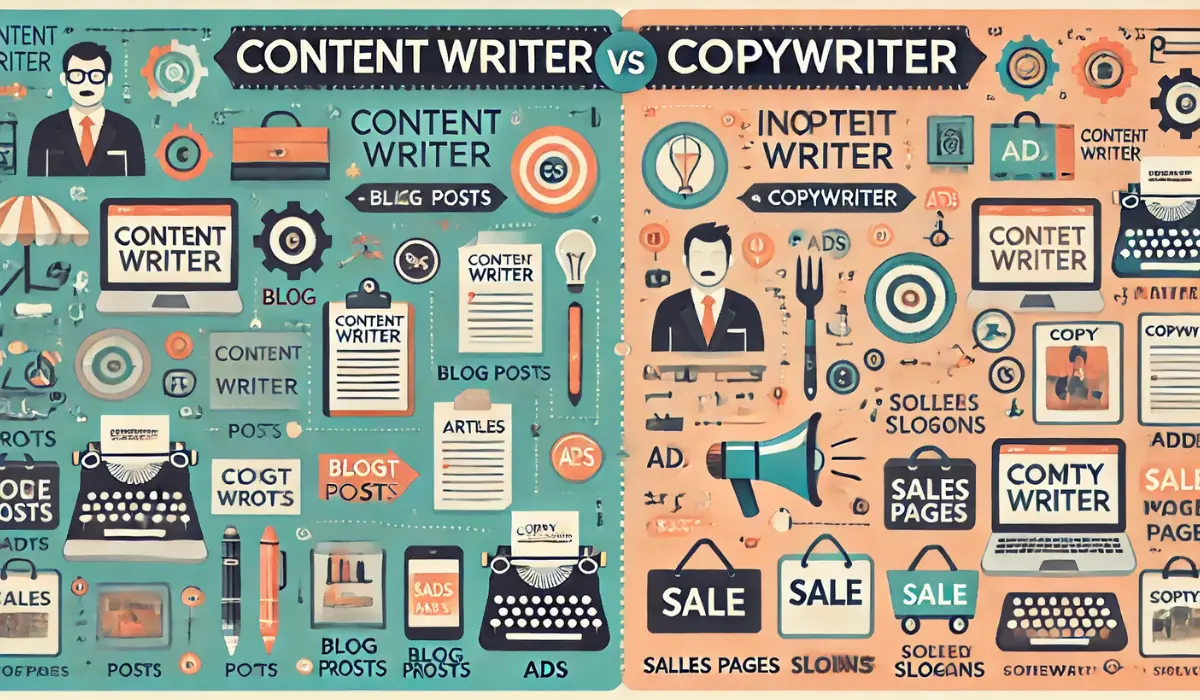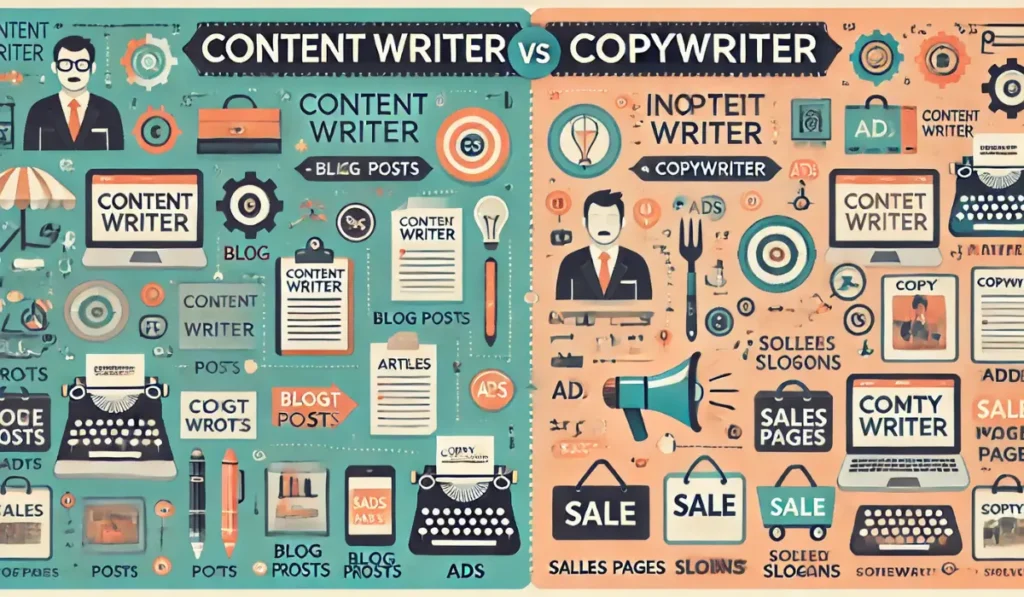In the world of digital marketing and writing, the terms “content writer” and “copywriter” are often used interchangeably. However, they have distinct roles, purposes, and skill sets. Understanding the difference between content writer and copywriter can help businesses and individuals choose the right professional for their specific needs.
What is a Content Writer?
A content writer is a professional who specializes in creating informative, engaging, and value-driven content. Their primary goal is to educate, inform, or entertain the audience while maintaining a consistent brand voice. Content writers focus on delivering long-form content that provides insights and builds trust with readers over time.
Key Responsibilities of a Content Writer:
- Writing blog posts and articles
- Creating whitepapers and case studies
- Producing eBooks and guides
- Developing website content
- Crafting long-form social media posts
- Researching to ensure accuracy and credibility
- Optimizing content for SEO to improve search rankings
- Collaborating with marketing teams to align content with brand strategy
- Editing and proofreading content to ensure clarity and quality
Skills Required for Content Writing:
- Strong research abilities
- Excellent writing and grammar skills
- SEO knowledge
- Storytelling and structuring engaging content
- Understanding audience needs and preferences
- Adaptability to different writing styles and tones
- Proficiency in content management systems (CMS) like WordPress
When to Hire a Content Writer?
Hiring a content writer is a smart move when you need high-quality, engaging, and SEO-friendly content but lack the time, skills, or resources to create it yourself. Here are some key situations when hiring a content writer is essential:
1. When Building a Website or Blog
- You need clear, engaging, and well-structured content for pages like Home, About Us, Services, and Blog.
- SEO-optimized blog posts are required to drive organic traffic.
2. For Consistent Content Creation
- You want to post regularly on your blog, social media, or email newsletters but can’t maintain the schedule.
- Consistency helps improve SEO and keeps your audience engaged.
3. When Expanding Your Brand’s Online Presence
- You need articles, social media posts, and guest posts to increase visibility and authority.
- A professional writer ensures a consistent brand voice across platforms.
4. For SEO and Digital Marketing Campaigns
- You need keyword-optimized content to rank higher on search engines.
- Writers with SEO knowledge can create content that attracts both search engines and readers.
5. When Creating Sales and Marketing Copy
- You need persuasive content for product descriptions, landing pages, ads, and email marketing.
- A skilled writer knows how to convert readers into customers.
6. For Industry-Specific or Technical Content
- You need articles, whitepapers, or case studies that require research and technical expertise.
- Professional writers can simplify complex topics for your audience.
7. When Launching an eBook or Course
- You want to establish authority in your field with in-depth content like eBooks or guides.
- Writers can help you plan, draft, and polish your long-form content.
8. When Time Is Limited
- You’re busy managing other aspects of your business and can’t focus on content creation.
- Outsourcing to a writer frees up your time for strategic tasks.
What is a Copywriter?
A copywriter is a professional writer who focuses on creating persuasive and compelling text (copy) that encourages readers to take a specific action. Their primary goal is to drive conversions, whether that means making a sale, signing up for a newsletter, or clicking on an ad. Copywriters use persuasive language and psychological triggers to influence potential customers.
Key Responsibilities of a Copywriter:
- Creating Compelling Content: Write persuasive copy for websites, ads, emails, product descriptions, social media, and blogs.
- Crafting Headlines and Slogans: Develop catchy and engaging headlines that grab attention.
- Researching and Understanding Target Audiences: Tailor content to meet the needs, preferences, and pain points of the audience.
- Collaborating with Teams: Work with designers, marketers, and sales teams to ensure content aligns with brand goals.
- Editing and Proofreading: Review content to ensure clarity, grammar accuracy, and consistency.
- SEO Optimization: Use keywords effectively to improve search engine rankings without compromising content quality.
- A/B Testing Content: Develop and test different versions of copy to see which performs better.
- Maintaining Brand Voice: Ensure consistency in style, tone, and messaging across all platforms.
- Writing Scripts: Create scripts for video ads, podcasts, and promotional videos.
- Monitoring Content Performance: Analyze how content performs and adjust strategies for better results.
Skills Required for Copywriting:
- Writing Proficiency: Strong command of language, grammar, and storytelling techniques.
- Creativity: Ability to create unique and compelling messages that engage audiences.
- SEO Knowledge: Understanding of keyword research and on-page SEO strategies.
- Marketing Skills: Knowledge of marketing principles, consumer behavior, and trends.
- Research Skills: Ability to gather information quickly and effectively.
- Editing and Proofreading: Strong attention to detail to produce error-free content.
- Time Management: Ability to meet deadlines and manage multiple projects simultaneously.
- Adaptability: Ability to write for different platforms and audiences.
- Analytical Skills: Ability to analyze content performance metrics (e.g., click-through rates, conversions).
- Collaboration: Ability to work with designers, marketers, and clients to achieve content goals.
Also Read
When to Hire a Copywriter?
1. Launching or Rebranding Your Business
- You need powerful copy for your website, brochures, social media, and advertisements to make a lasting impression.
- A copywriter helps establish your brand voice and craft a compelling narrative.
2. Driving Sales and Conversions
- You want persuasive landing pages, email campaigns, and product descriptions that convert visitors into customers.
- Skilled copywriters use proven techniques to increase engagement and drive action.
3. Running Marketing and Advertising Campaigns
- You are creating ads for Google, social media, or other platforms and need attention-grabbing headlines and copy.
- Copywriters craft clear, impactful messages tailored to your target audience.
4. Creating Long-Form Content
- You want blog posts, eBooks, whitepapers, or case studies to educate your audience and boost SEO.
- Experienced copywriters research topics thoroughly and present them in an engaging, easy-to-read format.
5. Developing Brand Messaging and Taglines
- You need memorable slogans, mission statements, or brand stories that capture your brand’s essence.
- A copywriter ensures your messaging is concise, creative, and aligned with your brand identity.
6. Scaling Content Production
- You need consistent blog articles, social media content, or newsletters but lack the time to create them.
- Copywriters help you maintain a steady flow of quality content.
7. Improving Existing Content
- Your current website or marketing materials aren’t generating results.
- A copywriter can rewrite them for clarity, engagement, and better conversion rates.
8. Running A/B Tests and Content Experiments
- You want to test different headlines, ad copy, or email subject lines to see which performs best.
- A copywriter can quickly produce multiple variations to support your marketing tests.
Key Differences Between a Content Writer and a Copywriter
| Feature | Content Writer | Copywriter |
| Primary Goal | Inform, educate, and engage | Persuade and drive conversions |
| Content Type | Blogs, articles, whitepapers, guides | Ads, sales pages, product descriptions |
| Tone | Informational, engaging, storytelling | Persuasive, concise, action-driven |
| SEO Focus | High (for organic traffic growth) | Moderate (for high-converting content) |
| Audience | Readers looking for valuable insights | Consumers ready to take action |
Conclusion
While both content and copywriters play crucial roles in digital marketing, their purposes differ significantly. Content writers focus on providing value through informative and engaging content, whereas copywriters aim to persuade and convert readers into customers. Businesses should evaluate their goals before hiring a writer to ensure they get the right expertise for their needs.
By understanding these differences, you can effectively utilize both content writers and copywriters to achieve a balanced and successful content marketing strategy.





